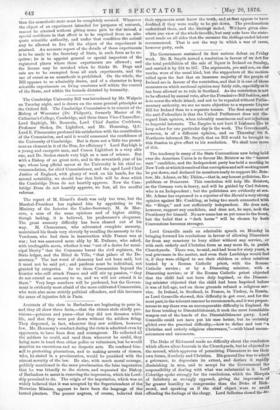Acaaunts of the riots in Barbadoes are beginning to pour
in, and they all show three facts,—that the rioters stole chiefly pro- visions—potatoes and yams—that they did not threaten white life, and, that they were put down without the soldiers firing. They dispersed, in fact, wherever they saw soldiers, however few. Mr. Hennessy's conduct during the riots is admitted even by opponents, to have been firm and courageous. He collected all the soldiers he could, and used them wherever he could, they being more in hand than either police or volunteers, but he would sanction no executions and no despotic acts. He confined him- self to protecting plantations, and to making arrests of rioters, who, he stated in a proclamation, would be punished with the utmost severity of the law. He also, with much moral courage, publicly mentioned in the same proclamation the false imputation that he was friendly to the rioters, and requested the Bishop of Barbadoes to assist in removing the impression, which his Lord- ship promised to do. The origin of the imputation, which was so widely believed that it was accepted by the Superintendent of the Moravian Mission, appears to have been the language of the heated planters. The poorer negroes, of course, believed that
their opponents must know the truth, and at-first appear to have I doubted if they were really to be put down. The proclamation undeceived them, and the riotings ended. 'We have given else- where our view of the whole trouble, but may note here the state- ment made on all sides that the moment the riotings ended labour- recommenced. That is not the way in which a war of racesr however petty, ends.






























 Previous page
Previous page